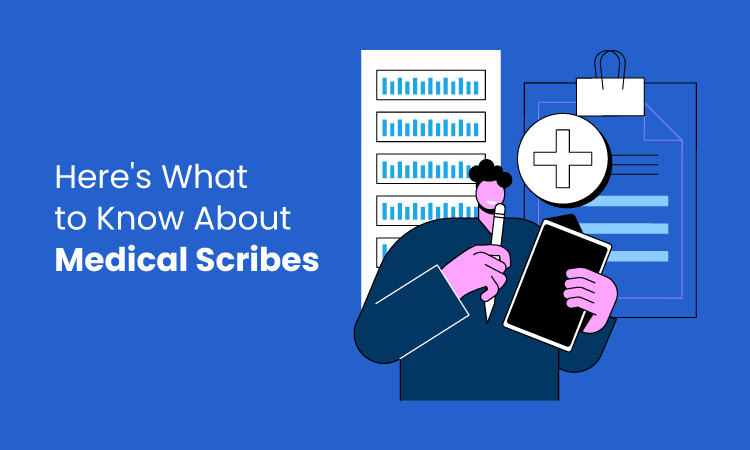Doctors are often overworked and overburdened with administrative and transcription tasks. Delegating some of these activities to other healthcare professionals, like medical scribes, will help ease their workload. But what does a medical scribe do, exactly? Keep reading—we'll take a closer look in this article!
What Does a Medical Scribe Do?
A medical scribe assists a healthcare provider (typically a physician) by documenting patient encounters in real time, including patient history, examination findings, and treatment plans.
The scribe notes the doctor's verbal instructions and observations in a patient's electronic medical record (EMR). This allows the doctor to focus on the patient, improving the visit's efficiency and accuracy. Medical scribes work in a fast-paced environment and require a strong attention to detail and the ability to multitask. Good communication and computer skills are also essential.
What are a Medical Scribe's Duties and Responsibilities?

A medical scribe's primary responsibility is to ensure that a doctor's instructions and observations are in the EMR. They also gather patient history and vital signs and enter them into the electronic record. Additionally, they may assist the doctor with patient exams and procedures by preparing equipment and documenting findings.
Another critical aspect of a scribe's job is ordering lab tests, imaging studies, and other diagnostic tests and entering the results into the EMR. They also communicate with other healthcare team members, such as nurses and pharmacists, to ensure that all patient information is accurate and up-to-date.
This healthcare professional may also schedule follow-up appointments and referrals to specialists. They do all of this while ensuring compliance with HIPAA and similar regulations and keeping up-to-date with changes in medical terminology and codes.
What Does a Medical Scribe Do to Gain Training?
Many employers prefer scribes to have some college education, although this is only sometimes required. Some college coursework in a related field, like Biology or Medical Technology, is also preferable.
Becoming a scribe requires a strong foundation in medical terminology, anatomy, and psychiatry. This knowledge is essential for understanding the medical language used by doctors and other healthcare professionals and accurately transcribing patient information into electronic records.
In addition to this medical knowledge, it is also vital for a medical scribe to be familiar with EMR systems and similar technology.
Many employers provide on-the-job training for scribes. Besides this training, certification programs can help increase a medical scribe's knowledge and skills and make them more competitive in the job market.
Pros and Cons of Becoming a Medical Scribe

While becoming a medical scribe can be an excellent opportunity for those interested in a healthcare career, it is crucial to weigh the pros and cons before making a decision.
Some advantages of becoming a medical scribe include gaining valuable experience in the medical field, having several career paths to choose from, and being in a personally fulfilling line of work.
However, it is also important to consider the potential downsides of the job, such as a fast-paced work environment, narrow margin for error, and the possibility of burnout.
A Medical Scribe Gains Plenty of Experience
Working as a medical scribe offers several advantages for individuals interested in pursuing a career in the healthcare field. One of the most significant benefits is the opportunity to gain valuable medical experience.
Scribes can observe and assist healthcare professionals in various settings, including emergency departments, clinics, and hospitals. This hands-on experience provides a great introduction to the medical field and could help someone decide which area of healthcare they would like to pursue.
Additionally, working as a medical scribe can also provide networking opportunities. Scribing positions often allow individuals to work closely with physicians, nurses, and other healthcare specialists. These connections can prove invaluable when looking for future job prospects or seeking letters of recommendation.
What Does a Medical Scribe Do Later On?
One potential track for a medical scribe is to continue working in the role while pursuing higher education. Many transcribers return to school to become nurses, physician assistants, or physicians. The medical experience they gain can be beneficial in these other roles.
Another potential path is to move into a supervisory or management role within the scribing industry. These positions may involve overseeing a team of scribes, training new hires, or working with healthcare facilities to improve their scribing operations.
Some scribes may transition into a related healthcare field, such as medical billing and coding, health informatics, or quality improvement. These positions also require knowledge and experience with electronic health records and medical terminology, skills acquired as a scribe.
Scribes Work in a High-Pressure Environment
Working as a medical scribe can be challenging due to the fast-paced nature of the job. These professionals are often required to keep up with the pace of an emergency department or high-traffic clinic.
Keeping up with the constant flow of new information can be challenging. Scribes must be able to process and transcribe large amounts of medical data quickly and accurately, which can be difficult when dealing with complex medical cases or unfamiliar medical terms.
Moreover, medical scribes must keep up with healthcare regulations and laws and ensure that the records they transcribe comply with them. This can add extra pressure to the job.
Errors Can Lead to Health Complications
Inaccurate documentation can lead to errors in diagnosis and treatment, which can have severe consequences for the patient's health.
For example, if a medical scribe mistakenly records a patient's symptoms or medical history, the physician may make a misdiagnosis or prescribe the wrong treatment. This can result in delayed or improper treatment, leading to serious health complications or even death.
Additionally, erroneous medical documentation can also lead to legal issues. If a patient's medical records contain errors, they can be used against the physician or healthcare facility in a malpractice lawsuit. Inaccurate medical documentation can also cause problems with billing and insurance claims.
There is Much Potential For Burnout
Medical scribes may experience burnout due to some factors, including long hours, high levels of stress, and the repetitive nature of their work. Additionally, medical writers may need more autonomy or control over their work and a lack of recognition for their contributions.
In some cases, medical scribes may also experience moral distress, which can occur when they witness patients receiving suboptimal care due to systemic issues within the healthcare system.
Why Do Medical Scribes Pursue the Field?
Despite the challenges of working in healthcare, many people still pursue becoming a medical scribe. Assisting healthcare professionals in providing high-quality care to patients can be incredibly rewarding. Scribes can see firsthand the positive impact their work has on the lives of those in need.
Additionally, being a medical scribe can provide a sense of purpose and belonging, as it allows one to be part of a team that works together for the well-being of others. It is a demanding and busy environment, but also very satisfying.
Hire a Trained, Dedicated Medical Scribe from Wing
A medical scribe is a trained professional working alongside physicians and other healthcare providers to document patient encounters in real time. Using a medical scribe has become increasingly popular to improve efficiency and productivity in healthcare settings.
Wing Assistant is the perfect solution for your medical transcription needs. Our highly trained and experienced scribes can accurately transcribe medical reports while ensuring that your sensitive medical information is confidential and secure. Get in touch today to learn more!
Aya is Wing Assistant’s blog manager. When she’s not wrangling content briefs, editing article drafts and handling on-page SEO, she is crafting messages for Wing’s other communication materials. Aya writes about SaaS startups, marketing for startups, search engine optimization, and pop culture.







